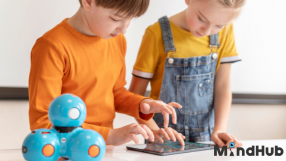
In today's fast-paced digital world, the demand for skilled programmers is greater than ever, and that's not likely to change. As technology continues to advance, employers are constantly on the lookout for programmers who possess not only strong technical knowledge but also a unique skill set that helps them adapt to the ever-changing technological world.
It’s important for children interested in programming to prepare for the future job market by acquiring the skills employers will seek.
This way, they will be one step closer to success and will be able to offer employers exactly what they need.
1. Coding Skills: The Basics
Before we look at the more specific skills important for young programmers, it's also crucial to mention the solid foundation in writing code. First, children begin to learn basic concepts with visual programming that develops their way of thinking. These core concepts are part of the compulsory levels, and children learn how to develop and apply them.
Then we move on to the additional levels where kids learn Python, Javascript, and HTML&CSS, which they learn syntax with. They’re the transition to programming and working with real programming languages. At MindHub, young enthusiasts easily master this subject, thanks to the innovative approaches of the mentors.
Children need to understand the basic syntax and logic of programming to build a solid foundation for future learning. At our academy, we focus on making coding fun and accessible, ensuring that students effectively understand the fundamental concepts behind it.
2. Problem-solving Skills
The ability to solve complex problems is at the heart of programming. Future employers will look for programmers who can analyze problems, break them down into smaller components, and find innovative solutions. Encourage children to work on game challenges and puzzles, fostering their problem-solving skills from an early age. We emphasize problem-solving exercises in our curriculum to prepare young learners for real-world programming challenges.
3. Critical Thinking
Programming isn't just about writing code; critical and logical thinking is also important. Future programmers have to be able to analyze problems from different angles, anticipate potential problems, and work toward effective solutions. At MindHub, we work to develop these skills, fostering kids’ analytical abilities alongside their coding skills. Critical thinking doesn’t mean skepticism; on the contrary, it predisposes to a more detailed insight into the matter under consideration, thereby screening out potential errors and problems.
4. Adaptability
The technology industry is evolving rapidly, regularly introducing new tools and frameworks. Employers will value programmers who can adapt to these changes without a problem. Children need to learn to embrace new technology and keep up with industry trends. It’s important that children from an early age become familiar with the different fields of programming and the technological world so that they can easily adapt to its consequent changes. That's why we use different programming environments. Children work with a variety of tools and learn how to think and work adaptively, which further develops their skills.
5. Teamwork
Although programming can be a lonely pursuit, the ability to work in a team is becoming increasingly important in the world of technology. Future developers will often work on projects with different teams. Teaching kids how to work with others, communicate effectively, and manage projects will prepare them for real-world scenarios. That is why at MindHub, we offer many group projects, which not only teach children how to distribute tasks in a team and skillfully adapt to work with other children but also predispose them to healthy competitive thinking. Children at MindHub work in pairs, which helps them express themselves better, be more patient, listen to each other, and create friendships that go beyond the academy.
6. Creativity and Innovative Thinking
Writing code isn't just about following predefined rules; it’s also about creative and innovative thinking. Employers are looking for programmers who can come up with unique solutions and think outside the box.
Encourage children to explore their creative side by developing their own projects and experimenting with different programming techniques. Through hands-on, project-based learning, creative thinking can be easily developed.
7. Cyber Security Awareness
In an increasingly digital world, cybersecurity is a top priority. Future programmers should understand the importance of data protection and be familiar with cybersecurity’s best practices. Children need to be taught about online safety and the ethical principles of hacking so that they know how to protect themselves from it and how to control the programming processes. From a young age, it’s good for them to get to know the computer as a device in general, and later, what are the niceties of using the Internet space, as well as the dangers it can hide.
8. Communication and Presentation Skills
Effective communication is essential in the workplace, whether in the field of programming or any other. When it comes to IT professionals, programmers must clearly communicate their ideas to non-tech-educated team members. Children need to develop their communication skills, including the ability to explain their ideas to others as well as defend their thesis. Presentation skills are equally important, although they also include communication skills. Public speaking is not for everyone, but a basic knowledge of how best to convey information is of great importance.
9. Desire for Growth
The technology industry is characterized by constant change, so programmers must commit to lifelong learning. Not only the coming changes in the technological world but also the pursuit of development suggest that kids should continue to learn and improve constantly. It’s good to encourage children to maintain their desire to grow and remain curious about new technologies. The great thing about MindHub groups is that we create an atmosphere that fosters a love for learning and provides resources for students to continue their education outside the classroom.
The Future is in Your Hands
As technology continues to shape our world, the demand for skilled programmers will only grow. To succeed in the future job market, young programmers need to go beyond coding proficiency and develop a set of skills. Employers will be looking for people who can think creatively, solve problems, work well in a team, and adapt easily to new technologies and innovations.
At MindHub, we are committed to preparing children for the future of programming. By focusing on these essential skills, we empower young learners to thrive in the ever-evolving technology industry. Whether your child dreams of becoming a software engineer, game developer, or programmer, our curriculum will help them develop those very skills and the mindset they need to excel in their journey through programming and outside of it.


